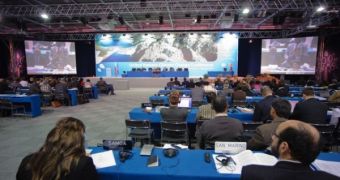In the first days of the Poznan Conference, where delegates from all around the world have gathered to discuss the threats posed by global warming and climate change, developing nations have requested high levels of subsidies from rich countries, to help them tackle issues such as deforestation and the preservation of tropical rain forests.
They say that, at their current level of development, they find it impossible to come up with effective methods and programs of holding back on cutting the trees, to make way for their increasing populations and decrease the need for food. Currently, carbon dioxide released from fires accounts for some 20 percent of the total amount of greenhouse gases (GHG) that is pumped into the atmosphere yearly.
As they grow, trees capture and store large amounts of carbon, which are completely eliminated when they burn, producing a dark and dense smoke. However, cutting them down is necessary in some places, as overcrowding in major urban centers creates the demand for more living space. In regard to the financing required, "It's imperative that the level of financing is up to the challenge, that's the basic starting point," a Brazilian official said at the conference.
The US-based Oxfam Group proposed that developed nations should pay an annual sum to the underdeveloped world, in the amount of at least $50 billion, which poor countries could use to set in place effective carbon emission-reducing measures. Forests aside, coal, natural gas and oil are the three most dangerous – and widespread – sources of heating, and they are also used extensively in power production. The host of the summit, Poland, relies on them for more than 90 percent of its electricity.
For countries such as this one, other solutions, like nuclear power plants, wind farms or solar-powered facilities, are not an option, because of their price tag, and the only way they can get rid of their dependency on these types of fuel is to receive subsidies from the outside. The leader of the UN Climate Change Secretariat, Yvo de Boer, said that he remained positive on the outcome of the negotiations and hinted that an agreement on climate change could be reached by 2009.

 14 DAY TRIAL //
14 DAY TRIAL //